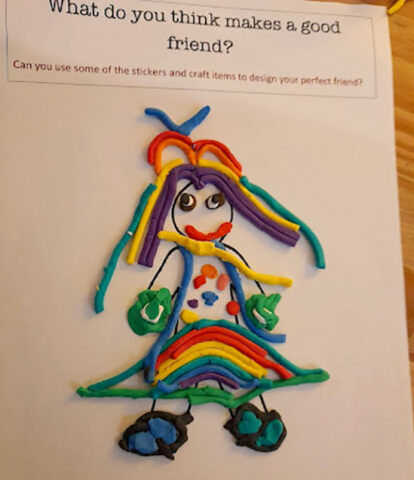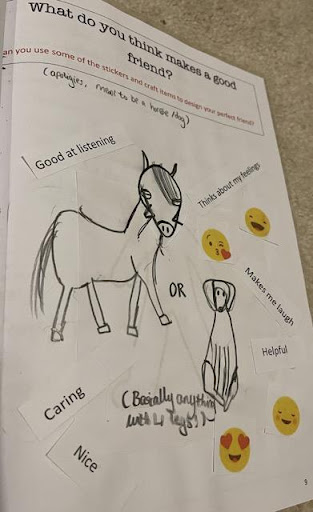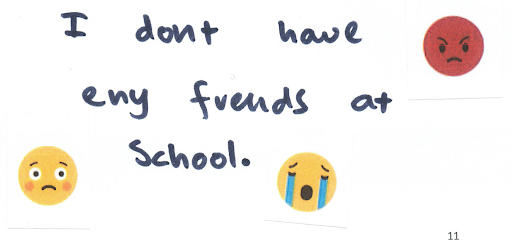How do autistic children experience their friendships?
April 2022
”It is hoped that by using novel, creative data collection techniques we will be able to gain a deep and rich insight into how autistic children feel about their own friendships and use these experiences to provide more tailored support to children and their families.”
The main study of my PhD uses creative, qualitative data collection methods to gain a deeper understanding of what friendship means to autistic children in the hope of informing future social interventions. The main study also gathers data from parents and teachers to investigate if their perceptions of children’s friendships are different from that of each other, and the child.

Why should we research autistic children’s friendships?
Friendship has been found to play an important protective role as children navigate their social world, providing social support and acting as a protective factor against bullying (Bossaert et al., 2015; Brendgen & Poulin, 2018). It has also been found to help support children when they are navigating transitions, such as the move to a new school (Daniel & Billingsley, 2010). This suggests that, for neurotypical children, having good quality friendships may protect children against negative experiences both in and outside of school.
However, we know it is not uncommon for autistic children to have fewer friends or lower quality peer relationships than their non-autistic peers. Autistic children and young people not only have difficulty making friends but maintaining them. This could suggest that autistic children are at a disadvantage when navigating school and their social worlds, as the buffer that reciprocal friendships provide may be missing. Therefore, exploring autistic children’s friendships could help us to support children in maintaining meaningful relationships which may in turn positively impact their wellbeing.
Research that explores the experiences and views of autistic children and young people is lacking. Though it is clear from previous research that autistic children are perceived as having friendship difficulties, little is known about how these children feel about their friendships, or lack of them. Exploring children’s experiences through traditional qualitative methods can be tricky, as they often rely on the use of oral language, which may be challenging for autistic individuals.
The current study and preliminary findings
My research aims to reduce the challenge of traditional methods by using non-verbal data collection techniques. Children were invited to complete a scrapbook in which they were able to write, draw, or build models of their perfect friends, and their real-life friends. Their responses were then further explored via a parent-led interview, which was video recorded and returned to me for analysis. Some children were able to speak about their real-life friendships, and how having someone to play games with was a happy and enjoyable experience for them. In line with previous literature, lots of children throughout the study focussed on having friends who were companions to them.

Other children found it difficult to talk about real-life friends. Many children reported that they didn’t have any friends and that this was something that they would like to change. Children were also aware of their diagnosis and how they believed that this impacted negatively on their ability to keep friends, as sometimes they wanted to play role-play games which other children thought were too ‘childish’.
Throughout the study, children expressed that the most important feature in a friend was to be helpful and kind, and that having a friend that was understanding of their needs was something they believed to be really important.
Next steps
The next step in my PhD is to analyse child, parent, and teacher data. This will be done using reflexive thematic analysis to explore patterns in the data. Each analysis will be discussed independently and any differences and similarities between the three groups will then be explored.
It is hoped that by using novel, creative data collection techniques we will be able to gain a deep and rich insight into how autistic children feel about their own friendships and use these experiences to provide more tailored support to children and their families.
Further Readings
Bossaert, G., Colpin, H., Pijl, S. J., & Petry, K. (2015). Quality of reciprocated friendships of students with special educational needs in mainstream seventh grade. Exceptionality, 23(1), 54-72.
Brendgen, M., & Poulin, F. (2018). Continued bullying victimization from childhood to young adulthood: A longitudinal study of mediating and protective factors. Journal of abnormal child psychology, 46(1), 27-39. https://doi.org/https://doi.org/10.1007/s10802-017-0314-5
Daniel, L. S., & Billingsley, B. S. (2010). What boys with an autism spectrum disorder say about establishing and maintaining friendships. Focus on Autism and Other Developmental Disabilities, 25(4), 220-229. https://doi.org/https://doi.org/10.1177/1088357610378290

